
| Sun System Handbook | Home | Systems | Components | General Info | Search | Feedback | |
|
|
||
|
| ||
 |
|
|||||||||||||
|
|
||||||||||||
|
Below you will find examples of the various configurations for 1 to 4 A5x00 Storage Arrays connected to a single or dual hosts.
For more complete details, please refer to the
 Sun StorEdge A5x00 Configuration Guide Sun StorEdge A5x00 Configuration Guide
1). Single Host, single loop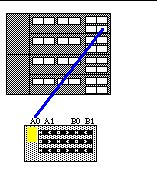
This is the most basic way to connect the A5000. Only a single path is provided. It is recommended to utilize multiple pathing, but this config can be used for direct replacement of singly connect SSAs. 2). Single Host, single HBA, dual loop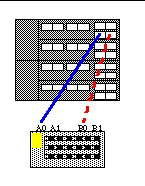
This example adds a second loop by dual porting the single adapter. This single adapter configuration looses the fault tolerance and performance of a dual adapter config, but is a lower cost option. 3). Single Host, dual HBA, dual loop (Recommeneded)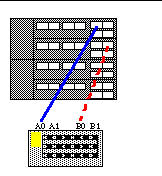
This is the recommended single host configuration. This adds both performance and redundancy to the single loop or single adapter configurations above. 4). Single Host, dual HBA, split loop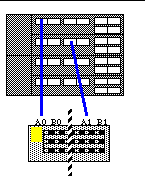
This is the minimum split loop configuration with only one path to the disks. This would be a good config for a single array server when the data is mirrored from the front disks to rear disks. 5). Single Host, dual HBA, dual path, split loop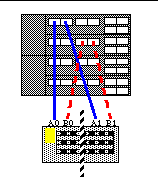
This is an improved split loop config with the added redundancy of dual paths which eliminates a single point of failure. 6). Single Host, four HBA, dual path, split loop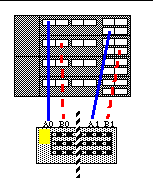
This is the optimal single host split loop config because it delivers both the highest fault tolerance and performance by utilizing all 4 loops on 4 separate HBAs and sbuses. 7). Dual Host, single loop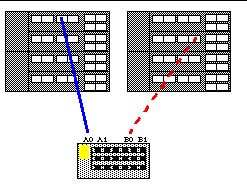
This is the most basic two host configuration. This is a direct replacement for a dual-hosted SSA config. As there are no redundant paths this is not the recommended config, although redundancy could be acheived by mirroring across arrays Note: That the two hosts use two physical loops. For clustering applications this is important since a single loop failure could bring the entire cluster down if both hosts were connected to the same loop. 8). Dual Host, dual HBA, dual path (Recommended)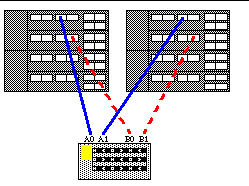
This is the recommended two host configuration. Each host has redundant paths to all devices. Shown is preferred manner of connecting where each path is to a different adapter on a different I/O card. Note: This dual path config is not currently supported with cluster software. 9). Dual Host, dual HBA, split loop shared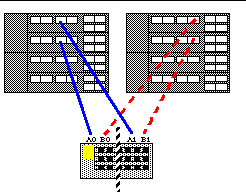
Both hosts can access all disks. This allows two hosts to share an array utilizing 4 loops. Each host has private use of 2 loops. This may be done for performance reasons. This config only provides a single path to each disk. 10). Dual Host, dual HBA, split loop private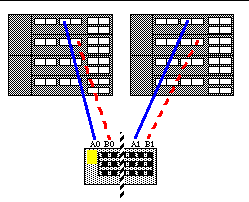
Each host sees only half the disks or one backplane. This config is for box sharing where each host has private and exclusive access to half the array disks. This is useful to guarantee that the hosts do not interfer with each others disks. This is a fully redundant config. 11). Three and Four Host, single path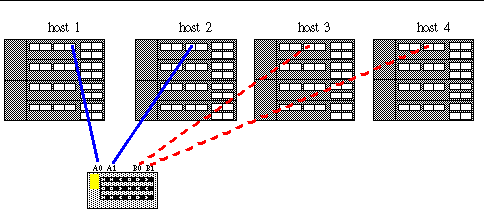
This single path configuration is currently the only way to support 3 and 4 host configs. This is sufficient to support clustering as the Clustering Software doesn't currently support dual pathing. Lack of A5000 ports, lack of HUB ports and technical drive issues all combine to make dual path configurations non-feasible at this time for more than 2 hosts. The above config shows four hosts however the removal of host 4 and its connection will create a 3 host config. Note: With a 3 host config one of the hosts could be dual pathed. 12). Three and Four Hosts, single path, dual array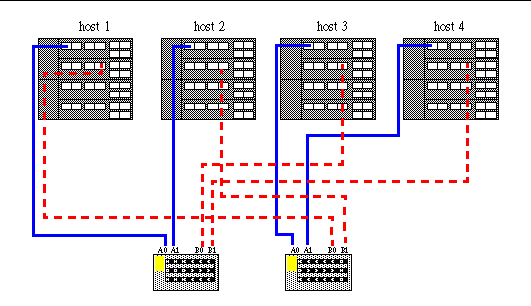
Redundancy can be added to the 3 and 4 host configurations by mirroring across arrays. This configuration is the basic building block for a four node cluster. 13). RAID5 RAS Configuration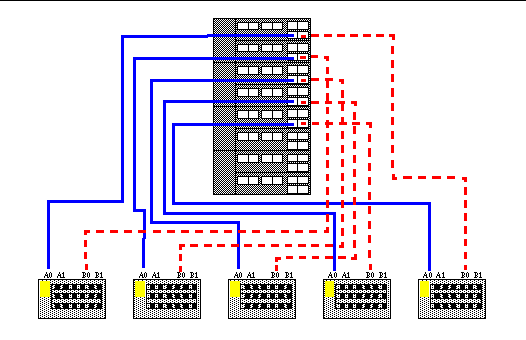
This is the most optimal RAID5 Reliability Availability Serviceability (RAS) hardware configuration possible. Configure the RAID5 volumes so that one disk in each array is used. This gives both very high fault tolerance in that even the failure of an entire array will not cause loss of data. Plus this config can utilize the full bandwidth of 10 loops giving the highest possible throughput of 1000MB/s. This configuration can only be implemented with a host based raid software package. | ||||||||||||
|
||||||||||||